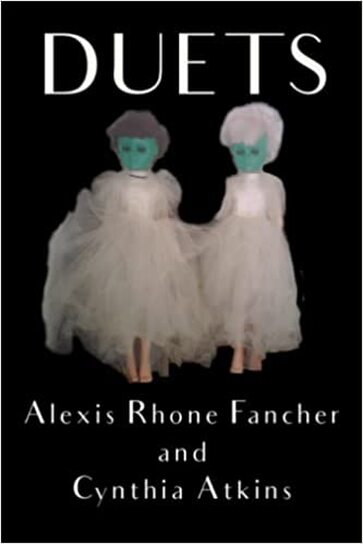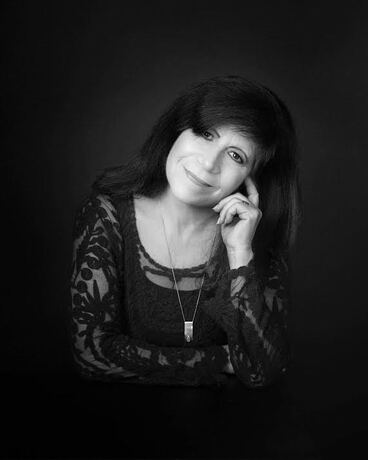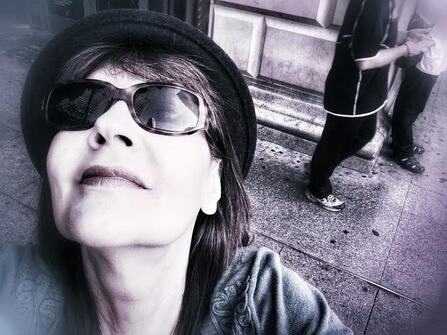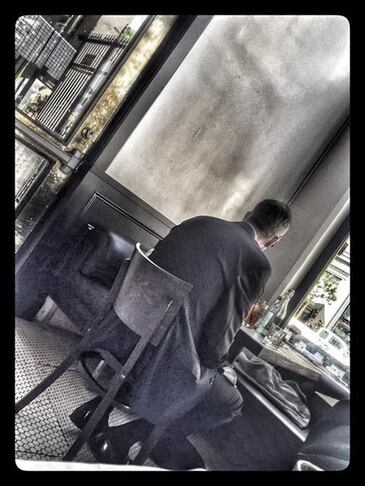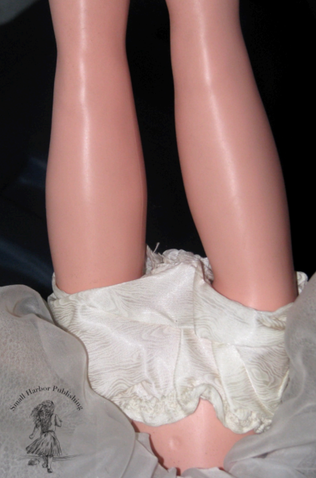|
Duets: Alexis Rhone Fancher and Cynthia Atkins Small Harbor Publishing, 2022 Click here or on image cover above to view or purchase. We are so excited to announce an incredible duet! Duets is a new ekphrastic collaboration between two luminaries, Alexis Rhone Fancher and Cynthia Atkins. Both poets write from Alexis's iconic photography to create an unforgettable ekphrastic dialogue. In this showcase, we have interviews with both Cynthia and Alexis. Scroll down after for a photo followed by the accompanying poetry of both. Cynthia The Ekphrastic Review: Talk to us about the collaboration process and how it worked for you artistically. Collaborating with another artist can bring so much but it also gives boundaries and limitations. What challenges did you experience? In what ways was your muse accelerated or changed? Cynthia Atkins: Way before this project that became, Duets, I have always been inspired by Alexis’s work—her boldness, and raw intuitions, her ability to write about taboo subjects with such honesty. My poems tend to be more cerebral, but also about taboo subjects, such as mental health. Her work has loosened up mine and challenged me to take more risks and move the boundary lines. Even though our voices are wholly different, I think they bounce off and complement one another, challenge the reader. But this is the first time I have actually shared my work like this in this way, my poetry. It is different when things bounce and reflect off one another. In other parts of my life, I have had to share things, stuffed toys, siblings, husbands—the detritus of life. For me, my writing has always been my place of solitude and spiritual questioning. So, to share this “spiritual” space is something new for me. I’m not gonna lie, it will be challenging, even with the best of friends. Our egos, our sense of ourselves. But more and more, the older I get, the ART is more about process, than outcomes. These two years writing Duets was so cathartic during the darkest covid days, writing these poems together was an anchor, it saved me from a real lonely abyss-- “It is because I dove into the abyss that I am beginning to love the abyss I am made of.”—Clarice Lispector... But the process has been so gratifying mixing our metaphors. It opened doors. The Ekphrastic Review: Tell us a bit about the selection process for the photography. Did you look at many options and see what spilled out, then gather your favourites, or did you curate the imagery and then wait for the muse to work its magic on those pieces? Were you both in agreement when it came to choosing the pictures? Cynthia: Yes, nice question on process---Usually, Alexis sent two photos for us to choose from—and was often gracious in letting me select the photo that spoke to me. A few she also selected. I looked at the photos as a ‘taking off’ point, not trying to do any kind of direct narrative or illustration of the photo. It was fun and interesting to see the journey each photo took us on—and to compare how different our responses. I think the fact that every poem in the book was spoken for by an individual beautiful journal, without the journal having any knowledge of the accompanying photograph, speaks to the fact that each poem can stand on their own. I think this was important to both of us—when you see the photo with the poem, of course it adds a whole new layer of aesthetic intrigue, more pathos, new questions. Art keeps giving. The Ekphrastic Review: How do you usually approach ekphrasis? What kind of imaginative field work takes place for you? How do you tend to find a way into the artwork, and where do you end up? Was this different for you, knowing the artist? Cynthia: Because I have always done visual Art myself (collage, drawing, printmaking) visual imagery has always spoken to me as a poet—I find poetry to be more like experiencing a painting, rather than a work of fiction. Painting, art poetry are siblings, and bounce off of each other’s metaphorical possibilities. I like to jump into the visual narrative as a jumping off point, but not be limited to that narrative. It’s an entry point, not a final destination. The Ekphrastic Review: What themes or experiences are you usually drawn to in your poetry? How do your poems in Duets fit in or differ from that path? Cynthia: I have always written about family, mental health, trauma and healing. Duets was project we started at the beginning of the pandemic, to help allay our fears and ability to concentrate. Those were uncertain times, back before vaccines and when people were calling and singing out windows, and sirens were blaring through cities. And the dark dystopian times, neo-fascists are literally taking away our reproductive freedoms, books being banned, all of it. So having these images to respond and having my counterpart in art crime at my side, made for a way to get through. Some people play cards, some knit, some walk and chew gum, we wrote poems and “Duet” was the beautiful outcome of our alchemy of mutual artistic respect and sisterhood. The Ekphrastic Review: Your poetry uses dazzling language to explore the spiritual, the erotic, and the morbid. Tell us about the ways these themes inform your work, and how they are connected. Cynthia: Thank you for the kind words. Ahhh, the ‘spiritual, erotic, and morbid’ are the essential elements of life if you think about it. We are made of flesh and bone, as Djuna Barnes said, “Our bones ache only while the flesh is on them.” As a young girl, I found that words made my boat float. I like the sounds of them, I liked writing them, I liked reading the dictionary and discovering new words and their meanings. To this day, I find indelible magic and amazement that only twenty-six sticks of letters in an alphabet, rub together to compose all the books in all the libraries. They are lineage, precursor, lush and full or lorn. Yes, I do love words. The Ekphrastic Review: What is your favourite poem by Alexis in this collection? Tell us about what moves you. Cynthia: Each of her poems has a special place in my heart because we workshopped these poems closely, so I know them well, and made suggestions for edits. So I feel close to the work. But “Identity Theft” speaks to me on so many levels, about self and selfhood, motherhood, and all the hats and selves we wear. She strikes just the right tone in this poem, so sad, but not saccharin. The poem moves and torques so well and takes me on a ride of pathos and loss and reminders of all the small and large thefts we endure to live. It’s such a stunning and heartbreaking poem: “Then I wake up hungry. And my ID, keys, and my boy are still gone.” This poem has so many levels, speaks to what Alexis does so well with her word magic. The Ekphrastic Review: What poem of your own was the most difficult to birth? Why? Are you happy with how it came together? Cynthia: “My Privacy Settings” was a difficult one for me because as a white privileged person writing about racial subjects can be touchy, sensitive and cross boundaries. I had wanted to write a poem about my early childhood friend, Angelica—a mixed race girl—who couldn’t come to my birthday party because Martin Luther King, Jr had been assassinated. At eight, I couldn’t understand why she was grieving for someone she didn’t know and why someone she didn’t know would keep her from coming to my party—someone she did know and was close to? —Of course my understanding came much later. We lost touch long ago, but it has since bothered me that I didn’t show Angelica proper understanding and sympathy. The poem was hard to write for these reasons and the cultural miasma of discomfort about the subject of race. I’m so glad for the prompt photo that helped me push it through, and happy with it because it was a kind of apology poem to my long lost beautiful friend. Alexis The Ekphrastic Review: Talk to us about the collaboration process and how it worked for you artistically. Collaborating with another artist can bring so much but it also gives boundaries and limitations. What challenges did you experience? In what ways was your muse accelerated or changed? Alexis Rhone Fancher: Although DUETS is our first poetry book collaboration, and we live on opposite ends of the country, Cynthia and I have been friends for over a decade. Nurtured by poetry and cemented by a shared aesthetic and a dark sense of humor, our friendship has sustained us both. The collaboration that resulted in DUETS didn’t start out that way. We’ve met to write/edit weekly for the past few years via phone and computer, and the result has been remarkable. Every poem we’ve written has been published in a kick-ass journal, and we’ve each grown as poets, editing each other’s work with care and a critical eye. We trust each other, trust that the work will be edited with love. The Ekphrastic Review: How did it feel to read Cynthia’s words in response to your photography? Were there any surprises in how that played out? Alexis: We chose each photo together, and then retreated to our writing spaces, each using the same photo to tempt the muse. Meeting every week to read/edit that week’s poems kept us honest in the sense that we had to produce a poem for each week’s meeting. And it was fascinating to read Cynthia’s response to my photos. Her poems were SO different than mine. Hard to believe they were each inspired by the same photograph. The more I read Cynthia’s poem responses, the more I saw the genius in her words. The Ekphrastic Review: What is it like writing ekphrasis to your own work? Did the process come naturally, expressing yourself from the same well as your photography, or did it give you a different way in to your own artwork? Alexis: Writing ekphrastic poems to my own photos is something I have always done. Most of my poetry books and chapbooks contain my photos as illustrations. Sometimes the poem informs the photo, sometimes the photo provides the inspiration. While my photos anchor me, they also provide a launching pad by inspiring a poem, as they did here with DUETS. I also design all my own book covers. Control freak? Moi? The Ekphrastic Review: Tell us a bit about your process as a photographer. What drives you? How do you work? How do you hope people look at your photographs, here and elsewhere? Alexis: My photography allows me to record my world in real time. I shoot portraits in my studio with a Nikon D810 camera and an 85mm or 135mm portrait lense. Far more formal than my “street” photos, shot with my iPhone 13 Pro Max. Can’t say which I love more, controlling everything. Or nothing. You can check out my photos on my website: alexisrhonefancher.com. As for how I want people to look at my photos, I’d say with an open mind and an intense curiosity. The Ekphrastic Review: You are famous for your candid confrontation with two epic topics, both personal and archetypal, in your poetry: sex, and death. How is your treatment on these themes in this collection similar or different from your other works? Alexis: DUETS is different than my previous collections/chapbooks in that it contains both erotic poems and poems about my family/personal life. I normally keep the two topics separate, but it felt right. “Bad Mother” snugged up against the erotic. “In the Drink” just worked for me. The Ekphrastic Review: What poem of Cynthia’s stands out to you the most in this collection? Tell us about how it speaks to you. Alexis: I love “Diminution, 11 AM.” It’s brilliant. We are both huge Edward Hopper fans and I was fascinated by how totally different Cynthia’s poem about my “Hopperesque” photo was from mine. Brilliant. The Ekphrastic Review: Was there a poem of your own that you struggled with? Tell us the story of your most challenging piece in the collection. Alexis: “Fire & Ice” was tricky. Informed by real life events, I was careful with how I described our outlaw spouses. I know my second husband, Eric is long dead, and Annie’s spouse, Jonathan, has also been dead for decades. I’ve lost touch with Annie, although the 16X20 portrait of her hangs in my studio for inspiration. We were two innocent women, married to gangsters, in way out of our depth. I survived. Don’t know if Annie did. Hope so. “We Are All Hopper Paintings Now” —Jonathan Jones The Guardian, UK (27 March 2020) That’s me, solo table at The Automat, staring into a cold cup of tea; me, just out of frame, driving up to the lonely pump jockey in Gas. My sister says I have a “bad picker,” that my type (well-hung and irresponsible) is very very bad for me, and she’s right. I wouldn’t know a good guy if he snatched me up off the street in broad daylight, I tell her. My point, exactly, my sister chides. I decide not to tell her about the stranger I’m chatting with online. He wants to send me on a train trip, meet him in Detroit, all expenses paid, and I admit, the thought makes me wet. That’s me, the woman reading in Compartment C Car, hurtling cross county toward a brand new life. I text him that I love Detroit, that I’m a fool for muscle cars. He says he’s a poet and an artist and a Buddhist. That he hasn’t owned a car in years. I confess, romance never ends well for me. Sometimes the loneliness screams so loud I want to drown myself in a tawdry romance novel with a sappy ending, or a bottomless glass of rye. Sometimes I want to hitch a ride with a comely vagabond, a poet from Michigan, drive off into the sunset. I lived 15 years with a Lakota Sioux medicine man on Pine Ridge Indian reservation in SD, he texts. Lived on a deserted tropical island off the coast of Thailand, in a Tibetan Buddhist monastery in Kathmandu, traveled Europe, lived amongst Bedouin Arabs in the Negev desert. I text back a smiley face and wait. I want to hitchhike to Tierra del Fuego, he responds. Wanna go? If only he knew! I’m the woman staring out the bay window in Cape Cod Morning, desperate for my latest true love to reappear. He said he was going to the store for bread, gas up the Chevy. Be right back, he said. The cloudy sky mirrors my mood. I wait. And wait. You should know better, my sister says. There are no rescuers anymore. I know that. I’m the usherette leaning against the wall in New York Movie. I’ve seen that film a dozen times; I’m lost in reverie. Dressed in a thoughtful blue uniform, rebellion looks like the strappy-assed shoes, half-hidden on my feet. Alexis Rhone Fancher Also published in NYQ Magazine, Spring issue 2021. ** DIMINUTION, 11 AM after Edward Hopper Blue to yellow, the voice told me not to bathe. The voice said the window is a guardrail. Said today is just like tomorrow. There is no safety from the noise and the sorrow of birds. Told me to sit very still, like a red clay pot on a shelf. The voice said don’t take out the trash, don’t make-up the bed. Beauty only makes pain bellow worse, until the mattress takes up all the air in the room. Said to deadbolt the door where latchkey brats dwell. Once, my breasts were savvy as two new bucket seats. The railroad tracks took my love to another town, to raise another woman’s children. The voice said the sun will crack your skin like paint on an old wall. The voice said you’re not here, you’re an erasure. Said the radio would tune out the pathos of loose wires. Little motes of silence trip the air, my lips are hugging the voice. The chatter of teeth. Make yourself naked, make yourself null. Make yourself small as a toothpick in his teeth, with shoes like daggers. Cynthia Atkins This poem was first published in The Indianapolis Review.
1 Comment
9/26/2022 11:41:32 am
I am so grateful to @TheEkphrasticreview for this beautiful showcase "Duets"--it's presented so beautifully!
Reply
Your comment will be posted after it is approved.
Leave a Reply. |
The Ekphrastic Review
COOKIES/PRIVACY
This site uses cookies to deliver your best navigation experience this time and next. Continuing here means you consent to cookies. Thank you. Join us on Facebook:
July 2024
|
